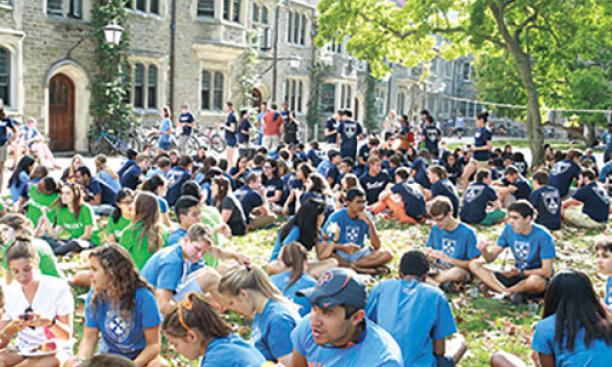

Members of the Class of 2018 took in the Chapel’s majesty — its gothic chancel, its soaring stained-glass windows, its high, vaulted ceiling — during Opening Exercises Sept. 7 as President Eisgruber ’83 drew parallels to another fantastical scene.
“Admit it, many of you are thinking that this Chapel looks a little bit like Hogwarts,” Eisgruber said, referring to the school attended by Harry Potter and his friends. “If that’s what you are feeling, you are right, because there is magic in this place.”
Urging the 1,312 freshmen to seek adventure and search for meaning during their campus years, Eisgruber said that beginning Princeton is “like the beginning not just of a new chapter, but of an entirely new book.”
Students seemed to appreciate Eisgruber’s literary allusions. His description of a Princeton experience composed of many chapters resonated with Mya Abousy, a freshman from McLean, Va. “There are still people out there that I haven’t gotten to meet who are going to make such a big impact on my life,” she said.
Sporting a “Team Forbes” T-shirt, Jasmine Peled, from Los Angeles, joked that although Eisgruber “made a lot of wrong Harry Potter references,” she “still appreciated his effort.”
Following Opening Exercises, the freshmen marched through FitzRandolph Gate in the Pre-rade as students and alumni cheered them on, waving orange 2018 pennants.
“I know the significance of that gate and it’s such a big tradition, but right when we were in it, and everyone was cheering, my heart kind of froze,” Abousy said, referring to the Princeton legend that students who walk out of the gate before Commencement will not get their degrees.
Some things this year were new. About 1,150 freshmen received the meningitis B vaccine during two clinics offered at orientation; some complained of “meng arm” — a sore forearm — but said they were not alarmed by the outbreak of nine meningitis cases associated with Princeton last year.
Eisgruber moderated an evening discussion in McCarter Theatre about the book Meaning in Life and Why It Matters, which all freshmen had been assigned to read over the summer. Taking part in the event were the book’s author, Susan Wolf *78, and a faculty panel that responded to Wolf’s arguments.
Wolf, a University of North Carolina philosophy professor, recounted the disappointment she has felt when observing students aspiring to comfort and prestige, rather than meaning. “If reading this book puts this aspiration on your radar, however you understand meaning, that will count for me as a terrific result,” she said.
Community Action, Princeton’s pre-orientation service program, took up Wolf’s call to action by discussing the book’s message and working to implement it. This year, Community Action expanded to partner with more than 50 organizations, ranging from nonprofit theater groups to faith-based communities, attracting 174 freshmen. (Outdoor Action trips drew 715 participants.)
Students volunteering with Habitat for Humanity in Trenton reflected on the meaning of relationships while renovating the organization’s headquarters and working in a Habitat facility that sells donated furniture and building materials. “We talked a lot about how we were building relationships through our community service and by building community,” said Karis Cha, a participant from Leesburg, Va.
Princeton’s 578 new graduate students also participated in orientation activities, including a panel offering faculty and student views on “Success in Graduate School.” One student asked about instances of failure, and electrical engineering professor Claire Gmachl responded that risk-taking is encouraged.
“A good research project is one that hasn’t been solved already and that inherently has some risk of failure,” Gmachl said. “Failure is built into the system because we’re breaking new ground, and that’s good.”
Applicants: 26,641
Admitted: 1,983 (7.4%, tied for a record low)
Enrolled: 1,313 (33 from the waitlist)
Yield: 66.2%
Students receiving financial aid: 58%
Male-to-female ratio: 51.6/48.4
Sons/daughters of alumni: 11.3%
All U.S. minority students: 43% (a record high — data for underrepresented minority students were not released)
Recruited varsity athletic prospects: 16.8%
International students: 11.2%
First-generation college: 11.8%
Pell Grant recipients: 18% (a record high)
From public schools: 59.3%
From private schools: 40.1%
Home-schooled: 0.6%
B.S.E. students: 23.8%
Number of U.S. military veterans: 0
Source: Office of Admission
Doctoral-degree students: 429
Master’s-degree students: 149
Applicants: 10,964
Admitted: 11%
Male-to-female ratio: 62/38
International students: 46%
All U.S. minority students: 13%
Underrepresented U.S. minority students: 7%
Sciences and engineering: 45%
Humanities and social sciences: 34%
Woodrow Wilson School: 15%
Architecture: 6%
Source: Office of the Dean of the Graduate School
